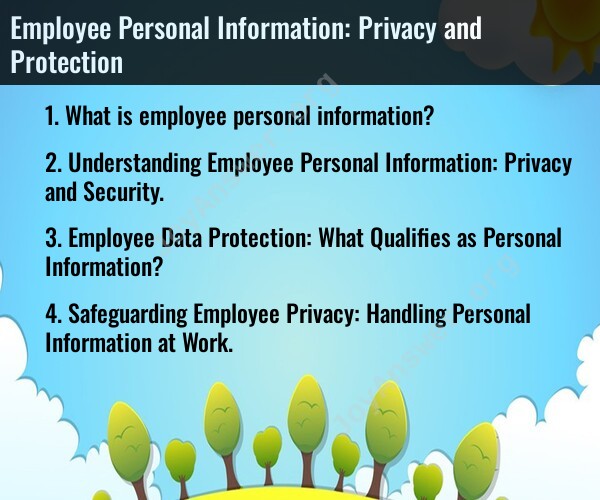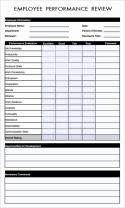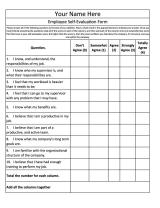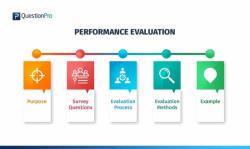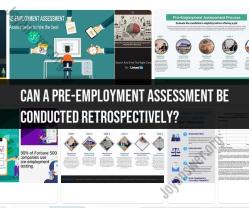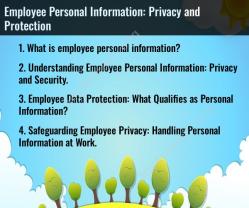What is employee personal information?
Employee personal information refers to the data and details that are related to an individual employee, typically collected and processed by an employer or HR department in the context of employment. This information may include a wide range of data points and can vary depending on the organization and the specific requirements of the job. Common examples of employee personal information include:
Identification Information:
- Full Name
- Date of Birth
- Social Security Number (or equivalent national identification number)
- Employee ID Number
Contact Information:
- Address
- Phone Number
- Email Address
- Emergency Contact Information
Employment Details:
- Job Title
- Department
- Employment Status (e.g., full-time, part-time, contract)
- Employment Start Date
- Salary and Compensation Details
- Employment History (previous employers and positions)
Payroll and Financial Information:
- Bank Account Details (for direct deposit)
- Tax Withholding Information
- Pay Stubs and Salary Information
Benefits and Insurance:
- Health Insurance Information
- Dental and Vision Insurance Information
- Retirement Plan Contributions
- Other Employee Benefits (e.g., life insurance, disability insurance)
Performance and Evaluation Data:
- Performance Reviews
- Evaluation Scores
- Goals and Objectives
- Disciplinary Records
Training and Development:
- Training History
- Certifications and Qualifications
- Continuing Education Records
Leave and Time-Off:
- Vacation and Paid Time-Off Balances
- Sick Leave Records
- Family and Medical Leave (FMLA) Records
Health and Wellness Information:
- Health Screening Results (if applicable)
- Fitness for Duty Certifications
- Medical Accommodation Requests (if applicable)
Workplace Communications:
- Emails and Correspondence
- Internal Messaging History
Workplace Access and Security:
- Access Card Information
- Login Credentials and Passwords
Workplace Conduct and Policies:
- Acknowledgment of Company Policies (e.g., Code of Conduct, Non-Discrimination Policies)
- Disciplinary Actions and Records
It's important to note that the collection and processing of employee personal information must comply with applicable privacy laws and regulations. Employers have a responsibility to protect the confidentiality and security of this information and to inform employees about how their data is being used. In some regions, such as the European Union, the General Data Protection Regulation (GDPR) imposes strict requirements on the handling of employee personal data.
Employees also have rights regarding their personal information, including the right to access their data, request corrections, and in some cases, withdraw consent for specific data processing activities. Employers should establish clear privacy policies and practices to ensure compliance with privacy laws and to protect both the organization and its employees.
Understanding Employee Personal Information: Privacy and Security
Employee personal information (PI) is any information that can be used to identify a specific employee, such as:
- Name
- Address
- Social Security number
- Date of birth
- Phone number
- Email address
- Medical information
- Financial information
- Employment history
- Education history
- Biometric data
Employers have a responsibility to protect the privacy and security of employee PI. This means taking steps to prevent unauthorized access, use, or disclosure of employee PI.
Employee Data Protection: What Qualifies as Personal Information?
In addition to the examples listed above, employee PI can also include:
- Employee performance reviews
- Disciplinary records
- Attendance records
- Salary information
- Benefits information
- Union membership status
- Work schedules
- Location data
Employers should carefully consider what information they collect about their employees and only collect information that is necessary for business purposes.
Safeguarding Employee Privacy: Handling Personal Information at Work
Employers can safeguard employee privacy by:
- Implementing and enforcing policies and procedures for handling employee PI.
- Training employees on how to handle employee PI securely.
- Using strong passwords and encryption to protect employee PI.
- Limiting access to employee PI to employees who need to know.
- Properly disposing of employee PI when it is no longer needed.
Employers should also be aware of the CCPA and other privacy laws that may apply to the collection and use of employee PI.
Here are some additional tips for safeguarding employee privacy:
- Be transparent about how you collect and use employee PI.
- Give employees choices about how their PI is used.
- Respond to employee data requests in a timely manner.
- Implement reasonable security measures to protect employee PI.
- Investigate and respond promptly to any suspected data breaches.
By taking these steps, employers can protect the privacy and security of employee PI and build trust with their employees.
